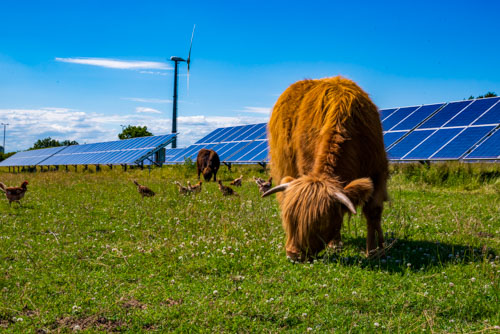Do you want to learn more about Sustainable Farming? If so, this blog post is for you. Sustainable farming is a broad subject therefore people may have different thoughts about what Sustainable Farming is. In this blog post I will explain it in more detail and how it contributes to an improved environment, supports local communities, and improves your health. And at the end I will provide several tips and tricks for you in case you would like to start a healthy garden.
Sustainable farming is a term that describes a range of farming practices which aim to produce food products without harming natural resources, land, or people. It is not only good for the planet, but also for the farmers and consumers who benefit from higher quality food products, lower costs, and greater food security.
Activities that contribute to Sustainable Farming
Here are several key principles and practices that contribute to Sustainable farming:

- Organic farming. Organic farming avoids the use of synthetic chemicals, such as pesticides, herbicides, and fertilizers, which can pollute the soil, water, and air. Instead, organic farmers rely on natural methods to control weeds, pests, and diseases. Organic farming also promotes soil health and fertility by adding organic matter and nutrients back into soil.
- Conserve water and energy. Water and energy are precious resources that should be used wisely and efficiently. Sustainable farmers use water-saving irrigation techniques, such as drip, rainwater harvesting, and mulching, to reduce water loss and evaporation. Sustainability causes farmers to also use renewable energy sources, such as solar, wind, or biogas, to power their farms and reduce greenhouse gas emissions.
- Diversify crops and animals. Diversity is the key to resilience and productivity in sustainable farming. By growing a variety of crops and raising different animals, sustainable farmers can reduce the risk of pests and diseases, improve soil quality, and create a balanced ecosystem. Diversity also helps farmers adapt to changing weather conditions and market demands.
- Maintain and protect biodiversity and wildlife. Biodiversity is the richness and variety of life on Earth. It includes all the plants, animals, microorganisms, and ecosystems that interact with each other. Sustainable farming protects biodiversity by creating habitats for wildlife, such as hedgerows, ponds, or trees. Sustainable farming also avoids practices that threaten biodiversity, such as deforestation, monoculture, or genetic engineering.
- Support local communities and markets. Sustainable farming is not only about the environment, but also about the local people who live and work on the land. Sustainable farmers support their local communities by providing jobs, education, and social services. They also sell their products locally or directly to consumers, which reduces transportation costs and emissions, and increases the product’s freshness and quality.
Tips to get started
If you want to start your own sustainable farm or garden, here are some suggestions for you to follow:
- Do your research. Learn as much as you can about sustainable farming methods and practices. You can read books, articles, blogs, or watch online videos. You can also visit or volunteer at one or more farms which implement these practices.
- Plan your garden or farm. Decide what kind of crops or animals you want to grow or cultivate, and how much space you will need. You can use online tools or apps to help you design your farm or garden layout. You should also consider your budget, climate, soil type, water availability, and market opportunities.
- Tools and materials. Depending on your scale and needs, you may need to purchase or rent some tools and materials for your farm or garden. These may include crop seeds or plants, mulch, irrigation equipment (systems), fencing, hand tools, equipment etc.
- Get started. Follow the best practices of sustainable farming that suit your situation. You can also join a network or online community of sustainable farmers or gardeners to share your experiences and learn from others.
How AgNote can help
AgNote (farm management software) is a practical tool that helps farmers plan, monitor, and optimize their farming operations. It can help with sustainable farming by enabling farmers to track their inputs and outputs, such as water, fertilizer, energy, and crops. By using crop data and analytics, farm management software will help farmers reduce their environmental impact, improve their efficiency, and increase their profitability. Farm management software can also help farmers comply with regulations and standards for sustainable farming practices. If you would like to try out AgNote, please register here for a free seven-day trial!
Sustainable farming is a rewarding and fulfilling way to grow food in harmony with nature and people. By following these principles and practices of sustainable farming, you can contribute to a healthier and happier world.